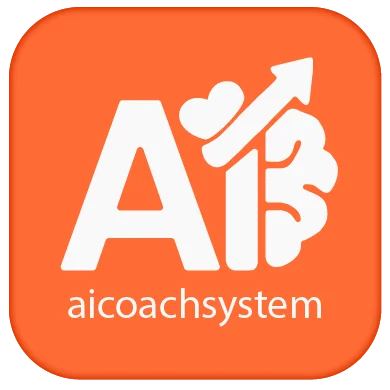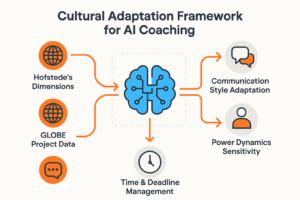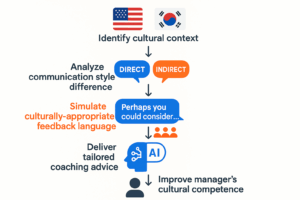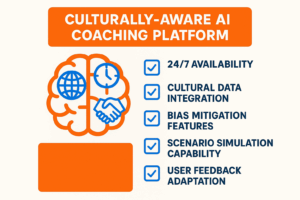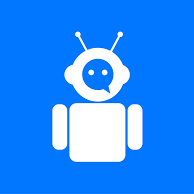Navigating Cultural Nuances: How AI Coaching is Revolutionizing Global Leadership
Imagine this: a high-performing manager from your Chicago office is leading a critical project with your team in Seoul. During a video call, she gives what she considers clear, direct, and constructive feedback to a team member. She’s trying to be efficient. But the feedback lands poorly. The Korean team member feels he has lost face, team morale dips, and the project quietly stalls.
This isn’t a failure of skill or intention; it’s a failure of cultural fluency. And it’s an incredibly common—and costly—problem. Failed expatriate assignments alone can cost companies anywhere from $250,000 to over $1 million. In our interconnected world, leading a cross-border team isn’t just a challenge; it’s the new standard. But how do you scale the nuanced, personalized training required to create truly effective global leaders?
The answer, surprisingly, lies in artificial intelligence. Not as a robotic replacement for human connection, but as a powerful, 24/7 partner that can help leaders navigate the complex tapestry of global cultures. Let’s explore how.
The New Frontier: AI vs. Human Coaching for Global Teams
When you hear “AI Coach,” you might picture a simple chatbot. The reality is far more sophisticated. Think of it as a digital mentor, trained on decades of leadership theory and thousands of real-world coaching sessions, designed to provide consistent, personalized guidance on demand.
But how does this stack up against traditional human coaching, especially for the unique challenges of global leadership?
Feature | Traditional Human Coach vs. Culturally-Aware AI Coach |
Scalability: Limited by one-on-one availability; difficult and expensive to deploy across a large, global team. vs. Infinitely scalable. One platform can provide consistent coaching to thousands of employees simultaneously.
24/7 Availability: Bound by time zones and schedules, creating delays for globally dispersed teams. vs. Instantly accessible anytime, anywhere, providing “in-the-moment” support before a crucial cross-cultural meeting.
Cultural Data Processing: Relies on the individual coach’s personal experience and training, which can be limited. vs. Can be trained on vast datasets of cultural frameworks (like Hofstede’s) and real-world interactions to recognize patterns.
Consistency: Quality and approach can vary significantly from one coach to another, leading to inconsistent development. vs. Delivers a standardized, high-quality coaching methodology across the entire organization, ensuring everyone works from the same playbook.
Bias Mitigation: Susceptible to unconscious personal biases that can influence coaching effectiveness. vs. When designed properly, AI can be programmed to identify and flag potential biases in communication, promoting more inclusive leadership.
While a human coach offers deep empathy, an AI coach provides unparalleled scale and data-driven insight—two critical components for developing leaders across a global enterprise.
The Core: How an AI Coach Learns to Speak “Culture”
This is where the magic happens. A culturally-aware AI isn’t just programmed with a list of holidays. It’s trained to understand the deep-seated “why” behind cultural behaviors. This is achieved through a multi-layered approach we can call the Cultural Adaptation Framework.
The Anatomy of a Culturally Intelligent AI
At its core, the AI integrates two types of knowledge:
- Foundational Frameworks: It learns from decades of cross-cultural research, such as Hofstede’s Cultural Dimensions Theory, which provides a language for understanding differences in areas like power distance (how a culture views hierarchy) and individualism vs. collectivism.
- Real-World Data: This is the game-changer. By training on anonymized transcripts from thousands of real coaching sessions involving leaders from diverse backgrounds, the AI learns the subtle, practical application of these theories. It recognizes patterns in language, tone, and conversational structure unique to different cultures. This is where AI-driven coaching services build their unique advantage.
This dual approach allows the AI to move beyond theory and offer practical, scenario-based guidance.
Scenario 1: Bridging Communication Gaps (Direct vs. Indirect)
The Challenge: An American manager needs to give urgent feedback to a developer in Japan. American culture generally values direct, explicit communication (“low-context”). Japanese culture often relies on indirect, implicit communication (“high-context”) to maintain group harmony. A direct approach could be perceived as aggressive and disrespectful.
How the AI Coach Helps: Before the conversation, the manager can role-play with her AI coach. The AI advises her to:
- Start by acknowledging the team’s collective effort.
- Phrase the feedback as a collaborative problem to be solved, rather than a personal critique.
- Use softening language, such as “Perhaps we could consider…” instead of “You need to change…”
The result is feedback that is both understood and well-received, preserving the relationship and keeping the project on track.
Scenario 2: Adapting to Power Dynamics (Hierarchical vs. Egalitarian)
The Challenge: A leader from Sweden, where workplace culture is famously flat and egalitarian, is struggling to get buy-in from her new team in India, where a more hierarchical structure is common. Her collaborative, “first-among-equals” style is being misinterpreted as a lack of authority.
How the AI Coach Helps: The AI coach can help her understand the concept of “power distance.” It might suggest she initially establish her authority by making a few clear, decisive calls on the project’s direction before transitioning to a more inclusive brainstorming style. This builds the team’s confidence in her leadership within their own cultural context.
Putting Theory into Practice: AI Coaching in the Real World
This isn’t just theoretical. Major global companies are already reaping the benefits.
Case Study Deep Dive: Experian’s “Nadia”
Global information services company Experian deployed an AI coach named “Nadia” to provide scalable development for its workforce. The results were astounding: 90% of users returned to the platform, and it achieved a Net Promoter Score (NPS) comparable to top consumer brands. This demonstrates that AI-driven coaching isn’t just a novelty; it’s a sticky, effective tool that employees genuinely value for their growth.
Myth Buster: Addressing the Bias in the Machine
A common and valid concern is that an AI could perpetuate cultural stereotypes. This is where the quality of the training data is paramount. The best platforms address this head-on by:
- Using Diverse Data Sets: Training the AI on a wide spectrum of interactions from numerous cultures to avoid over-generalizing.
- Incorporating Human Oversight: Having diverse, expert human coaches regularly review the AI’s recommendations to refine its understanding and correct for biases.
- Focusing on Adaptation: Programming the AI not to label people, but to provide leaders with a framework for observing, asking questions, and adapting their own style.
Your Guide to Choosing a Culturally-Aware AI Coaching Partner
As you explore options, it’s crucial to look beyond the surface-level features. A truly effective platform for global teams is built on a deep understanding of cultural dynamics.
Use this checklist to evaluate potential partners:
- Training Methodology: Ask how the AI is trained. Does it rely solely on academic models, or is it enriched with real-world coaching data?
- Scenario-Based Practice: Does the platform allow leaders to practice difficult cross-cultural conversations in a safe, simulated environment?
- Adaptability vs. Stereotyping: Does the coaching encourage curiosity and adaptation, or does it offer rigid, stereotype-based advice?
- Feedback Loop: Can users provide feedback on the AI’s advice to help it learn and improve over time?
- Expert Backing: Is the AI system backed by an accredited institution with a long history in leadership development? This ensures the coaching principles are sound.
Frequently Asked Questions About AI and Cross-Cultural Coaching
Can AI truly understand something as human as culture?
It’s a great question. The AI doesn’t “understand” culture with human consciousness. Instead, it processes vast amounts of data to recognize patterns of communication, values, and norms associated with different cultural contexts. It acts as a guide, providing data-driven suggestions to help the human leader build their own understanding and empathy.
Will AI replace human coaches for global teams?
Not at all. The most powerful model is a hybrid one. AI is exceptional for providing scalable, 24/7 support and practice. It can handle 80% of common leadership challenges, freeing up human coaches to focus on the most complex, sensitive, and strategic issues where deep human empathy is irreplaceable.
How do I measure the effectiveness of this kind of coaching?
Effectiveness can be measured through a combination of qualitative and quantitative data:
- Behavioral Change: 360-degree feedback surveys can show if a leader’s cross-cultural communication has improved.
- Team Performance: Track metrics like project completion rates, team engagement scores, and employee retention on global teams.
- Platform Usage: High adoption and return user rates (like Experian’s) indicate that employees are finding real value in the tool.
The Future is Fluent: Your Next Step in Global Leadership
Leading across borders is no longer a niche skill—it is a core competency for modern leadership. The challenge has always been providing the consistent, personalized, and scalable training required to build true cultural fluency.
AI coaching has emerged as a powerful solution, transforming a complex, high-stakes problem into a manageable and measurable development opportunity. By providing leaders with an ever-present guide, it helps turn potential cultural misunderstandings into moments of connection and growth.
Ready to build a more connected and effective global team? Exploring the possibilities of personalized coaching is the perfect place to start your journey toward better leaders, better teams, and a better organization.
About the Author
Sami Bugay is the founder of The Integral Institute and aicoachsystem.com, a leadership and team coach, and a pioneer in integrating AI in coaching systems. You can reach him at [email protected].
